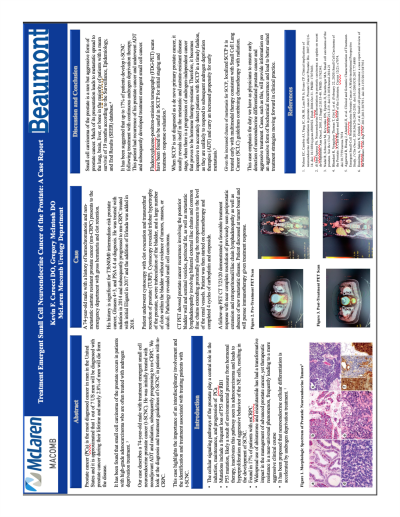Urological Surgery
Case Presentation: Treatment Emergent Small Cell Neuroendocrine Cancer of the Prostate

Has Audio
Introduction/Purpose: Our case describes a 74-year-old male with treatment emergent small cell neuroendocrine prostate cancer (t-SCNC). He was initially treated with neoadjuvant ADT and radiation, subsequently progressing to m-CRPC. We look at the diagnosis and treatment guidelines of t-SCNC in patients with m-CRPC.
Methods or Case Description: A 74-year-old male with a history of hemochromatosis and non-metastatic castrate resistant prostate cancer (nm-CRPC) presents to the Emergency Department with gross hematuria and clot retention. His history is significant for T3bN0M0 intermediate-risk prostate cancer, Gleason 4+3, and PSA 4.4 at diagnosis. He was treated with radiation in 2014 and subsequently progressed to nm-CRPC treated with initial Eligard in 2017 and the addition of Erleada was added in 2018. Patient underwent cystoscopy with clot evacuation and transurethral resection of prostate (TURP). Pathology revealed small cell carcinoma. A follow-up CT PET showed prostate cancer recurrence. Patient was then started on chemotherapy and completed 4 cycles of carboplatin and etoposide.
Outcomes: t-SCNC is thought to arise with therapeutic resistance to androgen receptor targeted therapy with an ensuing transformative impact on the cell histology to a more aggressive variant. Treatment includes chemotherapy +/- monoclonal antibodies. Our patient seems to have responded favorably with a follow up PET CT demonstrating a near complete resolution of previously seen periprostatic extension and retroperitoneal/iliac chain lymphadenopathy as well as absence of new metastatic disease.
Conclusion: Small cell carcinoma of the prostate (SCCP) is a rare malignancy that affects < 1% of the population. It has been suggested that up to 17% of patients develop t-SCNC following treatment with continuous androgen deprivation therapy. This patient had recurrence of his prostate cancer and underwent ADT and subsequently developed treatment emergent small cell cancer.
Methods or Case Description: A 74-year-old male with a history of hemochromatosis and non-metastatic castrate resistant prostate cancer (nm-CRPC) presents to the Emergency Department with gross hematuria and clot retention. His history is significant for T3bN0M0 intermediate-risk prostate cancer, Gleason 4+3, and PSA 4.4 at diagnosis. He was treated with radiation in 2014 and subsequently progressed to nm-CRPC treated with initial Eligard in 2017 and the addition of Erleada was added in 2018. Patient underwent cystoscopy with clot evacuation and transurethral resection of prostate (TURP). Pathology revealed small cell carcinoma. A follow-up CT PET showed prostate cancer recurrence. Patient was then started on chemotherapy and completed 4 cycles of carboplatin and etoposide.
Outcomes: t-SCNC is thought to arise with therapeutic resistance to androgen receptor targeted therapy with an ensuing transformative impact on the cell histology to a more aggressive variant. Treatment includes chemotherapy +/- monoclonal antibodies. Our patient seems to have responded favorably with a follow up PET CT demonstrating a near complete resolution of previously seen periprostatic extension and retroperitoneal/iliac chain lymphadenopathy as well as absence of new metastatic disease.
Conclusion: Small cell carcinoma of the prostate (SCCP) is a rare malignancy that affects < 1% of the population. It has been suggested that up to 17% of patients develop t-SCNC following treatment with continuous androgen deprivation therapy. This patient had recurrence of his prostate cancer and underwent ADT and subsequently developed treatment emergent small cell cancer.

Kevin F. Carocci, DO
Urological Surgery Resident, PGY2
MSU McLaren Macomb Urology
Troy, MI, US- GM
Gregory McIntosh, DO
MSU McLaren Macomb Residency Program Director
MSU McLaren Macomb
Mount Clemens, MI, US
